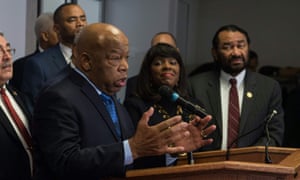Nice timing for the Sanders camp as they confirm this@chicagotribune pic is Bernie at 21 trib.in/1TrseQl
John Lewis: I did not mean to 'disparage' Bernie Sanders' civil rights activism
John Lewis speaks as the Congressional Black Caucus political action committee announces its endorsement of Hillary Clinton for president. Photograph: Nicholas Kamm/AFP/Getty Images
John Lewis, the influential congressman who this week appeared to dismiss Bernie Sanders’ credentials on civil rights issues, has sought to soften the ensuing controversy over his remarks.
On Thursday, as the Congressional Black Caucus (CBC) political action committee endorsed Sanders’ rival for the Democratic presidential nomination, Hillary Clinton, Lewis appeared to play down the Vermont senator’s involvement in the civil rights movement in its 1960s heyday.
“I never saw him,” Lewis said. “I never met him.”
On Saturday, he said he had not meant to express doubt “that Senator Sanders participated in the civil rights movement, neither was I attempting to disparage his activism”.
As the presidential primary campaign shifted its focus to South Carolina, which votes on Saturday 20 February, the comment attracted attention. Sanders lost to Clinton in Iowa by a hair and beat her soundly in New Hampshire, but Clinton has a solid support base among African American voters in the south, largely built during her husband Bill Clinton’s two general election wins.
Sanders, whose run for president has gathered significant momentum, has nonetheless trailed Clinton in most national opinion polls.
As a student at the University of Chicago, Sanders was involved in the Congress on Racial Equality and theStudent Nonviolent Coordinating Committee (SNCC), of which Lewis was chairman. Sanders was also arrestedwhile protesting. On the campaign trail, as he seeks to answer charges from opponents that he does not understand contemporary civil rights issues, he has discussed such experiences.
Lewis was a leader of the civil rights movement in the 1960s, prominently involved with the Freedom Riders of 1961, the 1963 March on Washington and Bloody Sunday in Selma, Alabama in 1965. In Selma, he was badly beaten by police.
On Saturday, the Georgia representative issued a statement through the CBC, in which he said: “In the interest of unity, I want to clarify the statement I made at Thursday’s news conference.
“I was responding to a reporter’s question who asked me to assess Senator Sanders’ civil rights record. I said that when I was leading and was at the center of pivotal actions within the civil rights movement, I did not meet Senator Bernie Sanders at any time.
“The fact that I did not meet him in the movement does not mean I doubted that Senator Sanders participated in the civil rights movement, neither was I attempting to disparage his activism. Thousands sacrificed in the 1960s whose names we will never know, and I have always given honor to their contribution.”
Comments by prominent supporters have become a key issue in the Democratic presidential contest. On Friday, former secretary of state Madeleine Albright wrote a New York Times op-ed column in which she sought to explain remarks made at a Clinton rally in New Hampshire last week, in which she appeared to say women should vote for Clinton on grounds of gender alone.
Lewis also clarified a comment made on Thursday in which he said he had known Bill and Hillary Clinton in the civil rights era.
Lewis said he “did not say that I met Hillary and Bill Clinton when I was chairman of SNCC in the 1960s”.
He added: “My point was that when I was doing the work of civil rights, led the Voter Education Project and organized voter registration in the south in the 1970s, I did cross paths with Hillary and Bill Clinton in the field. They were working in politics, and Bill Clinton became attorney general of Arkansas in the 1970s as well.
“That began a relationship with them that has lasted until today.”
- This article was amended on Saturday 13 February 2015. The endorsement of Clinton was made by the CBC political action committee, not the CBC itself as originally stated.
| Sat Feb. 20, 2016 1:59 PM EST
Alex Hanson/Flickr
When Bernie Sanders was a 21-year-old University of Chicago undergrad, he was arrested for resisting arrest at a 1963 anti-segregation protest on the South Side. As we've reported, the Vermont senator was a civil rights activist in college, leading his campus chapter of the Congress of Racial Equality in sit-ins on and off campus. He also attended the 1963 March on Washington. Now, the Chicago Tribune has unearthed a photo of the young presidential candidate being hauled away by police that same year.




No comments:
Post a Comment